The best AI search engines help you get answers to your queries in record time. You no longer need to visit multiple websites and scan through walls of text to find an answer to your query.
Top AI search engines employ advanced technologies such as machine learning, natural language processing, and computer vision to deliver accurate and personalized results.
In addition, AI search engines give you powerful capabilities that enhance your search experience and results. These capabilities include large context windows, recalling past searches, multiple LLMs, and more.
In this article, we will dive into the best AI search engines that will completely change how you search for information online. Let’s dive in!
Summary: Best AI Search Engines
Below find a quick summary of the top AI search engines.
1. Perplexity: Overall best AI search engine
2. Microsoft Copilot in Bing: Best AI search engine with image generation
3. Phind: Best AI search engine for software developers
4. You.com: Best AI search engine with multiple LLMs
5. Globe Explorer AI: Best AI search engine for STEM researchers
The Best AI Search Engines
Below we dive into the best AI search engines that have:
- Different use cases
- Multiple features
- Accurate and fast results
- Image generation
1. Perplexity: Overall best AI search engine
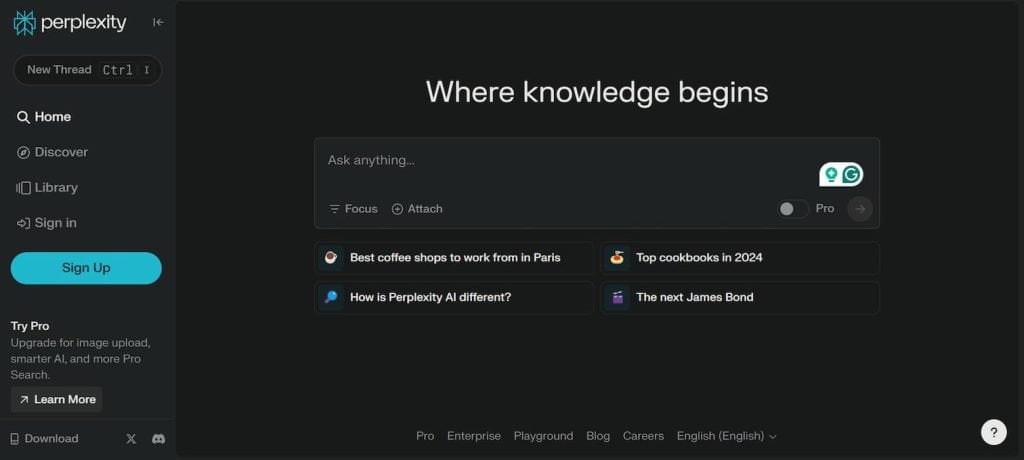
Perplexity was launched in 2022 as an alternative to traditional search engines. It’s an AI-powered chatbot that generates answers to queries from web sources and cites them. The upside to this is users get summarized answers to their queries saving them time from clicking on multiple websites.
In its short period of existence, Perplexity has exploded into popularity thanks to the convenience enabled by AI. I especially like the “Discover” feature that summarizes the latest global news.
Its pro version gives you access to the latest features as they are released, 600 pro searches a day, the option to choose your preferred AI model, and more.
2. Microsoft Copilot in Bing: Best AI search engine with image generation
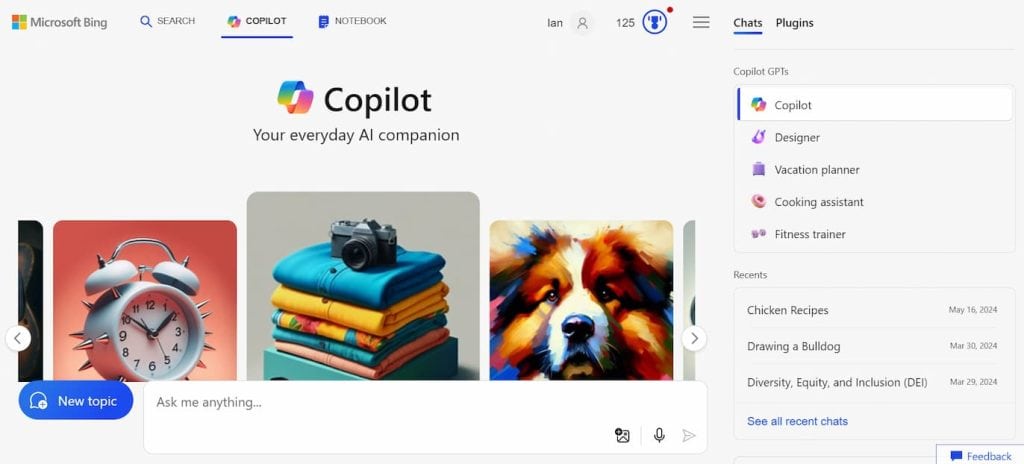
Thanks to Microsoft’s partnership with OpenAI, Bing is now an AI search engine powered by GPT-4. As you can imagine, this has completely revolutionized Bing as you know it.
Bing Copilot answers your queries immediately without needing to click on a website. The best part is Copilot can also generate images based on your text input. For example, you can generate an invitation card using Copilot.
To take your searches to the next level, you can incorporate plugins with Bing. Plugins such as Kayak for cheap flights, Suno for AI-generated music, and others.
3. Phind: Best AI search engine for software developers
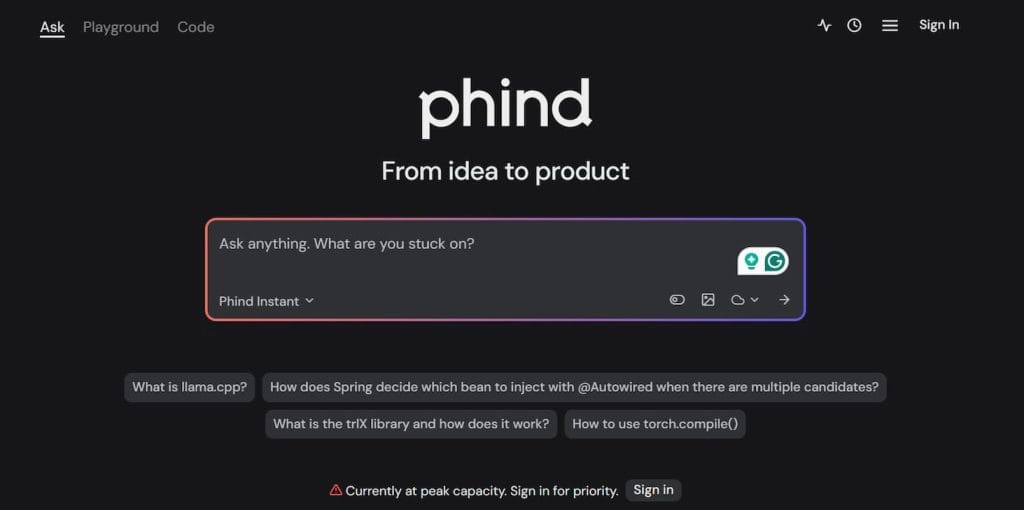
Phind is an AI-powered search engine designed for programmers. Its goal is to streamline the problem-solving process so developers can focus on more creative tasks.
It has a 32K context window which means you can copy-paste your code and have it processed at once. It remembers your previous searches and conversations better than Perplexity.
I tried uploading an image using the free account and it gave me an error that I’m out of GPT-4 uses for today, whatever that means.
My favorite feature is the Phind playground. It is an AI-chat support that’s ready to help you with your questions, like ChatGPT. You can choose from four models to power your chat: Phind-70b, GPT-4o, GPT-4 Trubo, and Claude Opus.
I also find it annoying that it forces you to create an account when you run a search. Otherwise, as a developer, I think Phind is quite handy and time-saving.
4. You.com: Best AI search engine with multiple LLMs
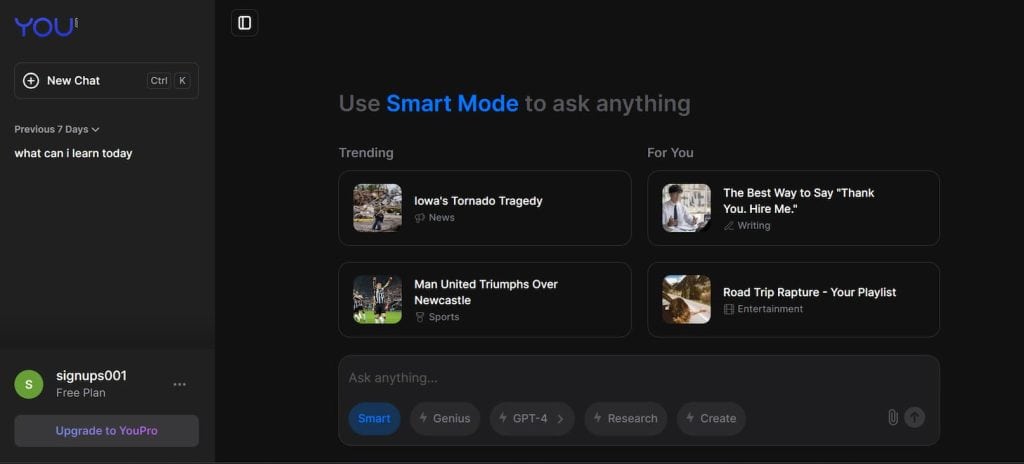
You.com is one of my favorite AI search engines. It’s super-easy to use, blazing fast and it can save and recall your queries like ChatGPT.
You can ask it anything from today’s healthy meal recipes to a playlist for your next road trip customized to your tastes. You.com’s power comes from the 15+ models you can choose from to power your responses.
The models include ChatGPT-4o, ChatGPT-4 Turbo, Gemini Pro, Claude 3, Claude 2, Llama 3, and more. The best part is you can access these models for free.
In addition, You.com has four modes, such as:
- Genius: Offers solutions to complex problems that require multiple steps.
- Research: Analysis, comparisons, and topic exploration with extensive citations.
- Create: Turn your ideas into images with different styles.
5. Globe Explorer AI: Best AI search engine for STEM researchers
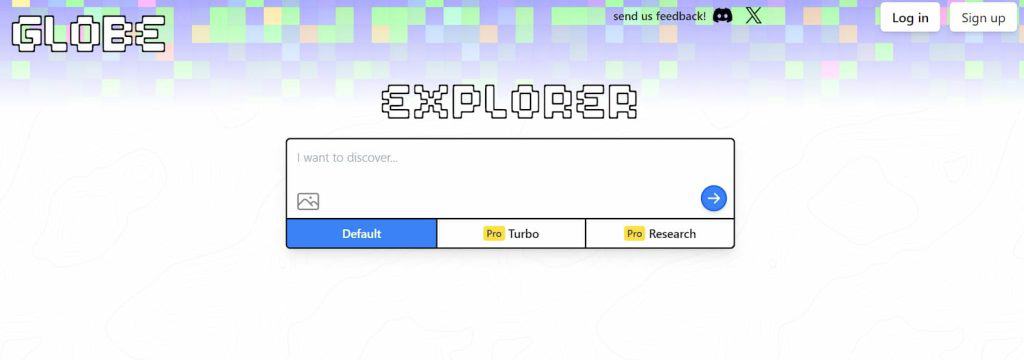
Globe Explorer AI breaks down topics using images. It also makes it easier for users to understand complex topics by taking them step-by-step through a problem making it ideal for STEM learners and researchers.
I don’t find the user interface to be appealing and engaging, but that’s a matter of user preference. It is fast considering it’s also generating visuals and breaking down topics.
It has three modes to choose from:
- Default: The slowest of the three, answers can be inaccurate, and it’s free.
- Pro turbo: Faster results, more intelligent than default, and great for topic overview.
- Research: Narrows down into a topic to offer more in-depth and accurate results.
6. Exa.ai: Best AI search engine for beginners
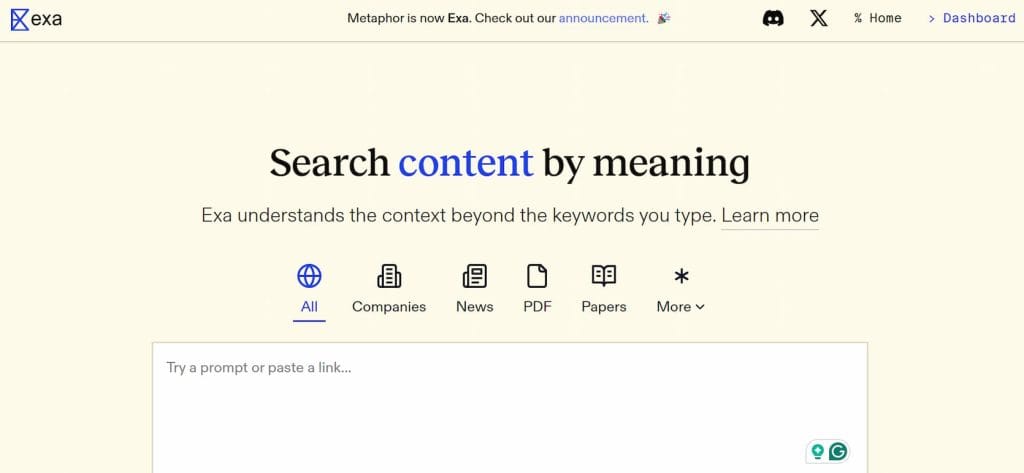
Exa.ai is one of the best AI search engines thanks to its unique features. For example, you can search through tweets (which I find myself doing a lot) for specific keywords, you can search through music and movies, PDFs, news, and more.
However, I noticed the results are not the most accurate and the user interface can be more user-friendly. That said, there are better AI search engines on this list but I included Exa.ai for its niche use cases you can’t find on any other AI search engine.
Why You Should Use An AI Search Engine?
Traditional search is time-consuming and cumbersome. Thanks to AI search engines, you can now get a well-packaged and complete answer to your queries without clicking on any website.
This saves you a lot of time going through several websites often loaded with unnecessary text just to get an answer.
Of course, AI search engines such as Perplexity and Phind clearly outline their sources for you to access more information if you’re interested.
How to Choose The Right AI Search Engine For You
Unlike traditional search, the best AI search engines are geared towards niche search such as Phind for coding, plus they contain different features. With that in mind, here’s how to pick the right AI search engine.
1. Identify your needs
What are you specifically searching for? Is it scientific, coding-related, or just a general question? Narrowing down on your needs will help you identify the right search engine.
2. Evaluate features
Top AI search engines have different features such as the number of searches you can run in a day, context window length, computer vision, image generation, file upload, available LLMs, and so much more.
The AI search engine you pick will depend on the features you need.
3. Test and compare
Before settling for an AI search engine be sure to test and compare a number of them. Also while testing, try running your queries using different AI models offered by the search engine.
By doing so, you’ll be able to evaluate the results and pick the right one.
Conclusion: Best AI Search Engines
Once you get used to searching the web with the best AI search engines, you’ll never go back to traditional search. AI search engines have made it incredibly fast to find information online.
In addition, thanks to the LLMs that power search, you can expect your search results to be broken down and presented in a manner that you can easily grasp, such as the use of media, metaphors, examples, and more.
Search has forever changed with the introduction of AI. Finding and consuming information online has never been easier, faster, and accessible to everyone.
- How to Build a AI Career Chatbot That Acts Like You [Easy] - July 18, 2025
- 10 Best Prompt Engineering Frameworks For Every Profession - June 17, 2025
- Prompt Engineering: The Ultimate Guide - June 15, 2025

